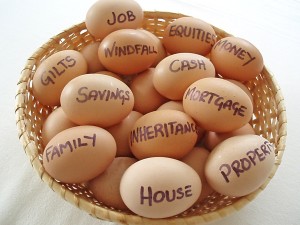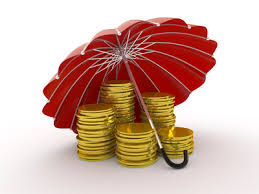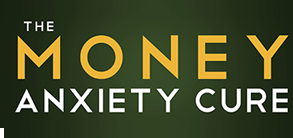In my last article, I discussed how many of the 99% have not had the same opportunities as the 1%, nor the good fortune to have mentors, or maybe had obligations that did not allow for the advanced education and training required for higher paying jobs.
I also admitted that I’ve seen some friends simply give up, frustrated they don’t have the right skills for the new economy, and don’t want the lower paying (more in demand) service jobs that would pull them back into the workforce.
There is no point in pointing fingers. We are all vulnerable to anxiety around money and around change. The question is whether this sort of stress pushes us over the edge — or inspires us to take positive action.
Personally, I have experienced both ends of the spectrum: spinning out of control with anxiety while trying to keep up with my colleagues and competitors in the real estate industry, as well as sitting in contemplation, reflecting on my personal prosperity, and able to take stock of all the spiritual and material wealth I possess.

I am grateful to have been able to make enough money, and equally grateful—just as importantly—to be able to shift my attitude around my finances, so I now come from a more conscious and embodied place. Of course, I still experience money anxiety disorder from time to time, but I am no longer a prisoner to it. Now, when I experience money anxiety, I witness it as a messenger who has come to tell me that it’s time to slow down and take stock.
The bottom line for all of us is that life can, and at some point will, deal us a different hand than we may have expected. Security is a myth, and we can’t control our future. What we can do is learn to re-tool, re-train, and re-align our minds so that we are better equipped—mentally, emotionally, and spiritually—to deal with the fluctuations in our finances and our lives.
The Dalai Lama said that the antidote to greed is contentment. “If you have a strong sense of contentment, it doesn’t matter whether you obtain the object or not; either way, you are still content.” I would also add, “Be content, but don’t be so content that you don’t challenge yourself. Simply be mindful not to let your journey be run by greed.”
For me, the antidote to greed has been a combination of generosity, gratitude and contentment for what I already have. The only way I know to balance out my craving for more money is to access my spiritual and creative sides, and to be in service so that I can give back, which I do with my ‘Money Anxiety Cure’ and ‘Mindfulness & Money’ courses, as well as the work I do in the prison system.

In addition, I’ve learned to recognize greediness in myself. When I experience it, I don’t feel good inside. Perhaps you, too, can reflect back on a time when you had enough of something, but still reached out and grabbed for more. Maybe you took a few too many cookies at a Christmas party, or perhaps you packed your schedule with too many activities. Maybe you heard about a ‘too good to be true’ investment and jumped on it without doing proper due diligence. These can all be considered lessons learned, as we become more skilled at noticing hindrances that come along to thwart our prosperity.
- Stay calm as you plan your financial future. Take regular breaks to breathe and collect your thoughts to ground and center yourself. Feel the earth solid under your feet.Here is a short list of things you can do to curb your money anxiety disorder:
- Invest time getting to know people in your community. Especially if you think you can benefit one another in some way. People are less guarded and more willing to accept help when they feel your sincerity.
- Invest in expanding your wisdom about who you are in the world. It’s the highest form of investment you can make in yourself. Explore to what extent you are open and generous, how it feels, and what it looks like. Explore to what extent you are not open and generous, and how it feels and what it looks like.
- Retreat. Slow down and fill up your spiritual bank account. Manage your money wisely and keep it running optimally so you can take advantage of the inevitable downturn. This is a mindfulness practice in itself. Practice being with the flow of your finances and choose to make wise decisions that have a wholesome financial outcome.
- Be generous. Give time, energy, and support to those in need, but remember to maintain compassionate boundaries. Being generous does not mean rescuing others, as this may actually prevent them from learning how to make it in the world.
- Be a lighthouse. Allow your love, kindness, wisdom, clarity, and compassion to flow out of you freely so others will become inspired. There is something magical about the act of giving, however unique the way in which it comes from you. Perhaps simply the generosity of a smile, your presence, or a listening ear.
- Flow. When you encounter a rock in the stream, flow around it. Remember the lessons of nature and use them. Don’t go where there is resistance or struggle. Go where there is flow, joy, peace.
- Have fun. Play and enjoy the journey. Allow for your inherent childlike curiosity to unfold and express itself without judgment. It’s in being in the spirit of playfulness, joy, and fun that most of best paintings are created. Pause often and check in to see if you are really having fun and to reconnect with yourself—body, mind, heart, and head. If you find tension, then you need to take another approach. Find and follow the joy, not the fear.
- Feel prosperous. There is such benefit to holding gratitude. I suggest you keep a journal, or have a “gratitude trigger” such as a flower you keep on your desk or nightstand. Every time you see your “gratitude trigger” consider one or two things to feel grateful for.
- Be in your body. If you notice yourself going into limited thinking mode or fixating on scarcity, pause, take a few deep breaths, connect with your body, and feel the abundance of support that is keeping you alive right now: the oxygen in your lungs, the blood in your veins, the engine that is your heart, your sense of smell, sight, touch. Why get stuck in limitation when you have such a brilliant body?
- Expect change. Just like the weather, the stock market, and the economy, and our bank accounts, everything will ebb and flow, but your faith doesn’t have to waiver. If you fall off, get back on track and hold a steady course toward your financial and spiritual goals. Remember the key is balance.
- Focus on the 3 Ps. Prioritize your values to focus on People, Planet, then Profit. We have one planet, one life, and very limited time to do the best job we can to be in service.
- Get comfortable with the numbers. Have a financial plan. Make sure it is flexible so it can adapt to changing economic cycles. When we are afraid, we make fear-based decisions. When we are upbeat and happy, we tend to have a more harmonious relationship with money. When you have a sound plan, you won’t be dragged around by your emotional mood swings. And plan for the long haul. Don’t worry about the ups and downs of the markets. Plan for five, ten, thirty years from now. Get help if this is a challenge for you!
We must always be prepared for the changes that come with each passing cycle. All aspects of impermanence can be transformative. They can all lead to deep prosperity if we are centered and balanced. The world gives us many tools with which to better prepare ourselves. The Buddha calls this “cultivating skillful means.” Using skillful means to approach your financial life will ultimately benefit all parts of your life.
